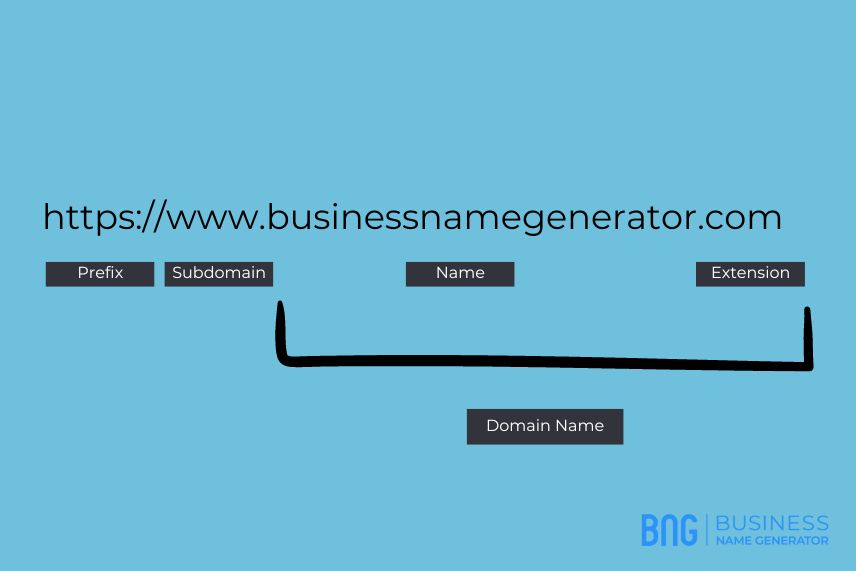A domain name is a string of text you type in your browser to access a website. It’s essentially your company’s unique internet website address.
When people want to visit your store or office, they need to go to your address, e.g., Main Street 4. The same principle works for domain names — if they want to visit your online site, they need to go to your online address, e.g., businessnamegenerator.com.
How Do Domain Names Work?
The thing is, your domain name is not your actual address. Computers don’t communicate in English; instead they use numbers – these numbers are called Internet Protocol addresses (IP address). Each website has its IP address (for example, 192.148.113.132). Now, nobody wants to remember a bunch of numbers, and domain names serve to help us out.
When you type in a domain name, your web browser interacts with a domain name system (DNS) that matches domain names with correlating IP addresses.
This is why it’s important to choose a domain name that’s catchy and memorable.
MORE: Domain name trends
Recommendation
You can use our AI-powered domain name generator to get 1,000+ domain name ideas in an instant.
Do I Need a Domain Name?
Regardless of whether you want to run a blog, an online business, or a physical store that has zero internet transactions, you need an online presence. Let’s face it, if you don’t have a website, you don’t exist.
The first step to a successful website is securing a domain name that will represent your business properly and be memorable for your customers to easily come back to.
MORE: Email domain names
Who Owns a Domain Name?
When you register a domain name, you don’t legally own it. Instead, you pay one of the domain name registrars for the right to use the name and can extend the subscription indefinitely. However, once you stop paying, the domain name is available for other people to “rent.”
MORE: Everything you need to know about who owns a domain name
Domain Name vs. URL: What’s the Difference?
You’ve probably heard of URLs used interchangeably with domain names. However, they’re not the same thing. The domain name is the bare name of your website, while a URL contains all the additional information, such as application protocols and paths. You also have fully qualified domain names that show the host (in most cases, it’s www).
To avoid getting technical for no reason, we’ll show you the difference between these using the address you’re on right now:
- Domain name: businessnamegenerator.com
- Fully qualified domain name: www.businessnamegenerator.com
- URL: https://www.businessnamegenerator.com/what-is-a-domain-name/
MORE: What is a subdomain?
Domain Name Types
Extensions, also known as top-level domains, are what appears after the second dot in your domain name. They serve to show certain elements of the website, such as geographical location, purpose, and type of content.
There are three most common domain name types:
- Top-level domains (TLDs): Generic domains, such as .com or .org.
- Country code top-level domains (ccTLDs): Domains from a specific country, e.g., .br for Brazil.
- Internationalized country code top-level domains (IDN ccTLDs): Dedicated to websites that use a non-Latin script (mostly used for websites in Arabic and Asian languages).
MORE: The different types of domain names explained
How to Get a Domain Name
The first thing you need to do is come up with a domain name you’re happy with. It can be the same as your business name, but you can also adapt it for online purposes. If you want to check out what names could work before you settle on one, you can use our domain name generator for inspiration.
Once you settle on a name, you need to do a domain name search and check if the domain name is available. Our generator does this for you automatically.
If the name is not available, you’ll have to buy it to use it. There are companies that base their entire business on buying and selling domain names only.
If it’s available, you need to register a domain name using domain name registrar. Remember, you never technically own the name — you pay for the right to use it and can extend the subscription. Once you stop paying, the website is available for others to use.
Depending on who you choose to register with, the domain name pricing will differ, together with the additional services you get with your hosting. It’s also good to understand the value of the domain name that your are buying.
MORE: Tips for buying a domain name
Key Takeaways
A domain name is your online address that people visit to see what your business is all about. The name should be easy to spell, memorable, and most importantly, available. There are technical nuances in how domain names work on a server level, but you don’t really need to know that in great detail.
All you need is a creative name that will get people to click and revisit it later on. You can use our domain name generator tool and get the perfect domain name in seconds.

